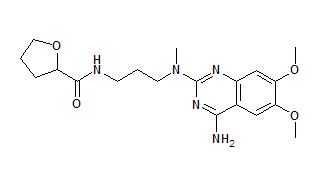Benign prostatic hypertrophy is a common condition. The incidence increases with age from 8 percent of men in the fourth decade of life to 90 percent in the ninth decade. The condition is often associated with micturition disorders. Symptoms of urinary obstruction are caused by the physical presence of hyperplastic tissue and changes in the tone of prostatic smooth muscle. Surgery is usually indicated if the symptoms are severe.
Evidence has been found that benign prostatic hypertrophy changes the response of urethral and bladder muscles to adrenergic stimuli, resulting in irritative symptoms. Chronic bladder outlet obstruction associated with detrusor instability occurs in about 70 percent of patients with prostatism. Jardin and colleagues conducted a multicenter study in Europe to assess the effectiveness of treatment with alfuzosin, an alpha-adrenergic antagonist (not available in the United States).
A total of 518 men with symptomatic benign prostatic hypertrophy were included in the study. Patients with concomitant urologic or other serious medical conditions were excluded. The patients were randomly allocated to receive either alfuzosin (7.5 mg per day) or placebo. This daily dose was given for 14 days. The daily dose could then be increased to 10 mg, depending on therapeutic response and tolerance. The two groups were comparable clinically.
During the six-month study, 70 patients in the treatment group and 92 in the placebo group withdrew or were lost to followup. The primary reason for withdrawal was lack of clinical improvement, although approximately 10 percent of the patients in each group withdrew because of side effects.
Response to treatment was measured with the Boyarsky scale, a numerical score of symptoms. The mean total Boyarsky score in the patients receiving alfuzosin fell from 9.5 to 5.5, which was significantly greater than the fall from 9.4 to 6.4 in the patients receiving placebo. In the 234 patients who underwent urodynamic studies, urinary flow rates increased and residual urine volume decreased significantly as a result of treatment.
The authors conclude that alfuzosin is well tolerated and leads to sustained symptomatic improvement in patients with benign prostatic hypertrophy. This type of medication will prove to be useful in patients for whom immediate surgery is not possible. The positive response to placebo in this study is also significant. Up to half of the patients receiving placebo demonstrated long-term improvement in at least one symptom, and 40 percent were satisfied with their improvement at the end of the study. (Lancet, June 15, 1991, vol. 337, p. 1457.)
COPYRIGHT 1991 American Academy of Family Physicians
COPYRIGHT 2004 Gale Group



